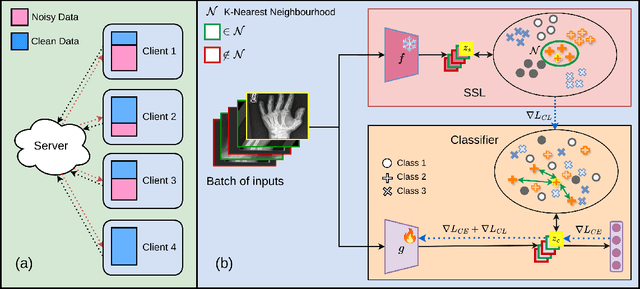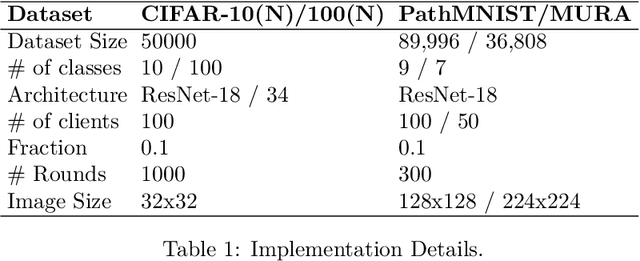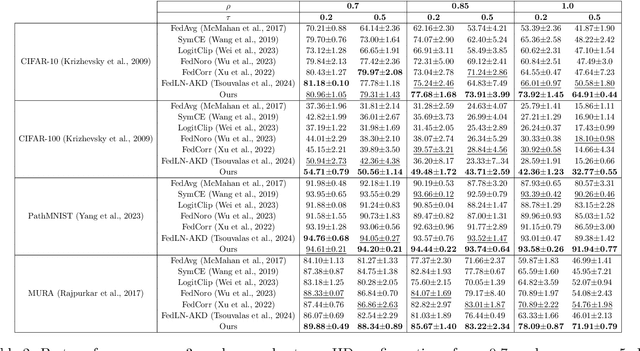Alina Devkota
Local K-Similarity Constraint for Federated Learning with Label Noise
Nov 09, 2025



Abstract:Federated learning on clients with noisy labels is a challenging problem, as such clients can infiltrate the global model, impacting the overall generalizability of the system. Existing methods proposed to handle noisy clients assume that a sufficient number of clients with clean labels are available, which can be leveraged to learn a robust global model while dampening the impact of noisy clients. This assumption fails when a high number of heterogeneous clients contain noisy labels, making the existing approaches ineffective. In such scenarios, it is important to locally regularize the clients before communication with the global model, to ensure the global model isn't corrupted by noisy clients. While pre-trained self-supervised models can be effective for local regularization, existing centralized approaches relying on pretrained initialization are impractical in a federated setting due to the potentially large size of these models, which increases communication costs. In that line, we propose a regularization objective for client models that decouples the pre-trained and classification models by enforcing similarity between close data points within the client. We leverage the representation space of a self-supervised pretrained model to evaluate the closeness among examples. This regularization, when applied with the standard objective function for the downstream task in standard noisy federated settings, significantly improves performance, outperforming existing state-of-the-art federated methods in multiple computer vision and medical image classification benchmarks. Unlike other techniques that rely on self-supervised pretrained initialization, our method does not require the pretrained model and classifier backbone to share the same architecture, making it architecture-agnostic.
Federated Foundation Model for GI Endoscopy Images
May 30, 2025Abstract:Gastrointestinal (GI) endoscopy is essential in identifying GI tract abnormalities in order to detect diseases in their early stages and improve patient outcomes. Although deep learning has shown success in supporting GI diagnostics and decision-making, these models require curated datasets with labels that are expensive to acquire. Foundation models offer a promising solution by learning general-purpose representations, which can be finetuned for specific tasks, overcoming data scarcity. Developing foundation models for medical imaging holds significant potential, but the sensitive and protected nature of medical data presents unique challenges. Foundation model training typically requires extensive datasets, and while hospitals generate large volumes of data, privacy restrictions prevent direct data sharing, making foundation model training infeasible in most scenarios. In this work, we propose a FL framework for training foundation models for gastroendoscopy imaging, enabling data to remain within local hospital environments while contributing to a shared model. We explore several established FL algorithms, assessing their suitability for training foundation models without relying on task-specific labels, conducting experiments in both homogeneous and heterogeneous settings. We evaluate the trained foundation model on three critical downstream tasks--classification, detection, and segmentation--and demonstrate that it achieves improved performance across all tasks, highlighting the effectiveness of our approach in a federated, privacy-preserving setting.
TE-SSL: Time and Event-aware Self Supervised Learning for Alzheimer's Disease Progression Analysis
Jul 09, 2024


Abstract:Alzheimer's Dementia (AD) represents one of the most pressing challenges in the field of neurodegenerative disorders, with its progression analysis being crucial for understanding disease dynamics and developing targeted interventions. Recent advancements in deep learning and various representation learning strategies, including self-supervised learning (SSL), have shown significant promise in enhancing medical image analysis, providing innovative ways to extract meaningful patterns from complex data. Notably, the computer vision literature has demonstrated that incorporating supervisory signals into SSL can further augment model performance by guiding the learning process with additional relevant information. However, the application of such supervisory signals in the context of disease progression analysis remains largely unexplored. This gap is particularly pronounced given the inherent challenges of incorporating both event and time-to-event information into the learning paradigm. Addressing this, we propose a novel framework, Time and Even-aware SSL (TE-SSL), which integrates time-to-event and event data as supervisory signals to refine the learning process. Our comparative analysis with existing SSL-based methods in the downstream task of survival analysis shows superior performance across standard metrics.
Multimodal Federated Learning in Healthcare: a review
Oct 14, 2023



Abstract:Recent advancements in multimodal machine learning have empowered the development of accurate and robust AI systems in the medical domain, especially within centralized database systems. Simultaneously, Federated Learning (FL) has progressed, providing a decentralized mechanism where data need not be consolidated, thereby enhancing the privacy and security of sensitive healthcare data. The integration of these two concepts supports the ongoing progress of multimodal learning in healthcare while ensuring the security and privacy of patient records within local data-holding agencies. This paper offers a concise overview of the significance of FL in healthcare and outlines the current state-of-the-art approaches to Multimodal Federated Learning (MMFL) within the healthcare domain. It comprehensively examines the existing challenges in the field, shedding light on the limitations of present models. Finally, the paper outlines potential directions for future advancements in the field, aiming to bridge the gap between cutting-edge AI technology and the imperative need for patient data privacy in healthcare applications.
 Add to Chrome
Add to Chrome Add to Firefox
Add to Firefox Add to Edge
Add to Edge